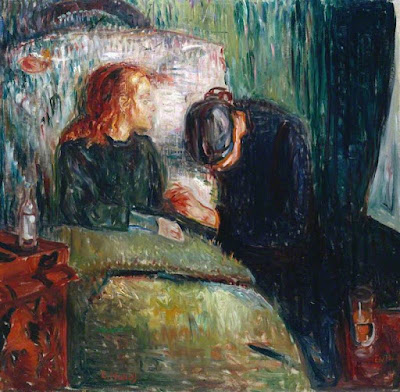The Age of Overdiagnosis?
You don't need to be a doctor to have noticed that certain medical diagnoses that used to be rare now appear common. Anecdotally at least, it feels like everyone either has ADHD or knows someone who does. Neurodivergence was one of the buzz words of 2024 and mood disorders such as depression and bipolar have skyrocketed.
The data backs this up. ADHD diagnoses doubled for boys and trebled for for girls between 2000 and 2018. In the 1940s, autism was thought to affect one in 2,500 children, while today one in 100 has been diagnosed. Chronic conditions with no strict diagnostic criteria, such as chronic Lyme disease and long Covid, have also become a part of daily life...
We are living in an "age of overdiagnosis," O'Sullivan says [Suzanne Sullivan is a consultant neurologist in the NHS] "We're turning people into patients, medicalising their lives and causing undue anxiety with no benefit."
 |
| The Sick Child Edvard Munch (1863-1944) Photo Credit: Tate [CC BY-NC-ND] |
An esteemed doctor for nearly 35 years, O'Sullivan works at the National Hospital for Neurology and Neurosurgery in London and in a specialist unit at the Epilepsy Society. She's also a prizewinning author of three acclaimed books, the last of which, All in the Head, focused on psychosomatic disorders that often manifest in a variety of nebulous and unpleasant symptoms that have now been given labels.
Her new book is The Age of Diagnosis: Sickness, Health and Why Medicine Has Gone Too Far, which explores why dubious labels are put on what the NHS calls "medically unexplained symptoms", as well as normal (if challenging) emotional states.
"People are not sad, they have low serotonin level," she says. "They are not forgetful or fidgety or unsettled, their 'brain is wired wrongly'." This feeds into an "illness identity" and can remove agency and incentives for people to try to improve their lot, she says.
O'Sullivan, along with many colleagues, is increasingly concerned that technological advances in scanning and an explosion in testing for diseases and genetic disorders (a lot of it DIY) is leading to people believing themselves to be seriously ill, when the sickness "discovered" may never manifest...
"We're not getting sicker - we are attributing more conditions to sickness. Borderline medical problems are becoming ironclad diagnoses and normal differences are being pathologised."...
Mental health diagnoses have been rising since the 1990s, yet not only are we not seeing any positive impact, she argues - we're now seeing one in five young people with a mental health condition. "I think we need to dial back some of the mental health awareness work that we're doing in schools. A recent study showed it added to emotional distress, rather that subtracting from it."...
What also frustrates her and many of her peers is how the eagerness for a diagnosis is dominated by the pushy "worried well". "Screening programmes often don't reach the people who really need help, who ignore invitations," she says. "Instead they're picking up educated people who worry about their health, who exercise and eat healthily."
Similarly, while ADHD is clearly a significant challenge for many, O'Sullivan - like many medics - think it is vastly over-diagnosed. She was a timid child and is relieved that no one saw her shyness as an issue. "I came out of myself just fine, but my worry is if you tell a child who's very much figuring out their strengths and weaknesses, that the reason they have social difficulties or intense interests or difficulty concentrating is related to a neurodevelopmental brain problem, it gives a really strong sense this can't be overcome"...
(Julia Llewellyn Smith, The Sunday Times, 2025)
Manna from heaven! Thank you, Dr O'Sullivan for giving us an expert, professional view on the perils of overdiagnosis. Is not sadness a normal part of life? And shyness? Is that not part of some people's temperament?
Comments
Post a Comment